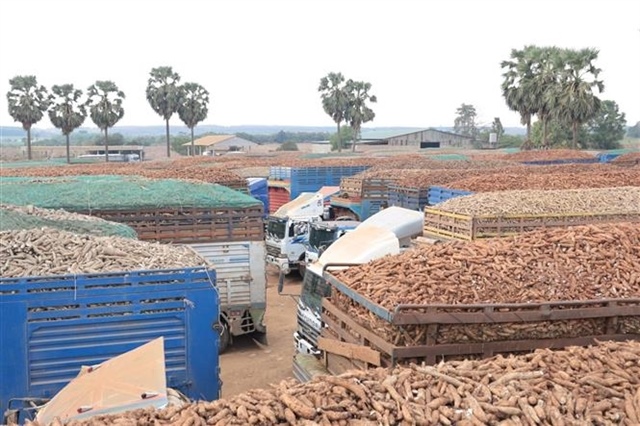Exporters of produce to China urged to follow customs procedures
Exporters of produce to China urged to follow customs procedures
The Ministry of Industry and Trade has advised local exporters of farm produce and fruit to China to keep a close watch on the customs clearance process around the upcoming Lunar New Year, or Tet, to guarantee the quality of their products and their export progress.
Large shipments, including food, farm produce and fruit, are usually sent from Vietnam’s northern border provinces to the neighboring country before and after Tet, according to the ministry’s Import and Export Department.
The department noted that the transportation of agricultural products frequently comes to a standstill at the northern border gates during the peak season, despite concerted efforts from the relevant ministries, agencies and local governments.
Therefore, the department has suggested local firms update the export developments of agricultural and aquatic products, and fruit in particular, through China-bordering provinces so that they can take a proactive approach in their production and packaging plans.
This approach could make the shipping and delivery process at border gates more efficient, especially in cases of traffic jams there, to ensure product quality is maintained.
The department also called on firms to classify their farm produce and fruit types and package them at their own production sites to meet their partners’ requirements, including specifications, quality, labels and packaging. This preparation is also aimed at speeding up the goods delivery process at border regions with China.
The firms were told to comply with regulations on traceability, the declaration of their farming areas and packaging facilities and other requirements to minimize damage in their production and business processes.
The Import and Export Department said the agency has already worked with the industry and trade departments of Vietnam’s northern border provinces, and has urged them to offer their support to local exporters and farmers.
Other measures include increasing working hours and adding more customs staff on peak days.
Tran Quoc Toan, deputy head of the Import and Export Department, noted in a statement that preventing congestion at border gates is crucial to ensure the goods’ quality and avoid losses for firms and farmers.
Toan added that local departments of industry and trade and of agriculture and rural development should regularly check farming production in terms of area, yield, output and quality to make adjustments to the supply and demand balance.
The purchase of locally produced agricultural products by both foreign and domestic traders must be monitored closely, he stated.
He said the volume of goods transported through border gates must be aligned with the actual customs clearance capacity.
According to Toan, the Ministry of Industry and Trade is collaborating with the relevant agencies to fast-track infrastructure development in the northern region.
He also advised firms to work closely with each other to prevent overproduction and falling prices over the long term.
Data from the General Department of Vietnam Customs showed that China was the largest buyer of Vietnamese farm produce between January and November last year, earning total revenue of US$5.33 billion. Next were the European Union at US$2.29 billion and the Association of Southeast Asian nations at US$2.03 billion.






















